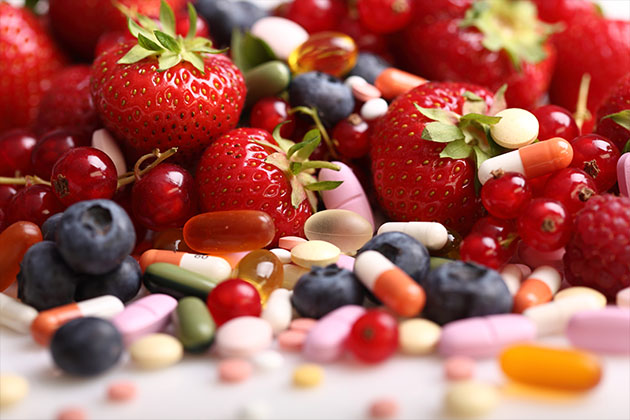Ketogeninė dieta (mažai angliavandenių, ribotas baltymų ir daug riebalų) rodo geresnį naujos klasės vėžio vaistų veiksmingumą gydant vėžį.
Vėžys gydymas buvo medicinos ir mokslinių tyrimų bendruomenės priešakyje visame pasaulyje. 100 procentų sėkmingas gydymas Vėžys is still not available and majority of research has been focusing on making Vėžys cells in the body susceptible to chemotherapy or radiation therapy or targeted medicines. An emerging new class of Vėžys drugs have been actively researched upon in the recent years. These drugs target a specific molecular pathway which become faulty in many types of Vėžys – a cell signalling pathway called phosphatidylinositol-3 kinase (PI3K), which is activated by insulin. PI3K, a family of enzymes plays a key role in many internal cellular functions that are involved in cancer. Genetic mutations in PI3K enzyme is present in most vėžinėmis tumours. It is this frequency of mutations which makes PI3K an appealing candidate to make anti-Vėžys drugs. Inhibiting pathway of this enzyme is seen as a potential way to attack Vėžys. For achieving this goal, more than 50 drugs have been designed and developed so far which have already been through clinical trials for testing for efficacy. Unfortunately, these clinical trials haven’t been much of a success, owing to questionable efficacy of these drugs and also their high toxicity. Taking such drugs which are going to inhibit the pathway leads to a drop in insulin in the body which only increases blood sugar level causing problems like hyperglycemia or abnormally high levels of blood sugar. Patients have to stop taking this drug because pancreas is eventually unable to make up for this loss by producing more insulin after doing it for some time.
Keto dietos derinimas su vėžio terapija
Naujas tyrimas paskelbtas Gamta parodė, kad ketogeninis arba keto dieta is efficient for eliminating some of the side effects of new generation Vėžys narkotikai and can be very beneficial in Vėžys therapy. The ketogenic diet constitutes of meat, eggs and avocados as staple food items. The idea of this diet is to eat very few carbohydrates – which are quickly broken down to blood sugar – and also moderate protein – which can also get converted into blood sugar. This diet makes our body produce small fuel molecules called ‘ketones’ (hence the name ketogenic) and they are produced in the body in the liver exclusively from only fat. Ketones are like an alternative fuel for the body whenever sugar (glucose) is in limited supply, including the brain. Therefore, the body basically switches its fuel supply and ‘runs’ entirely on fat as no carbohydrates and limited protein is being produced. This may not be the ideal scenario but is efficient to lose weight and maintain yourself. The keto diet has been used since many decades to control insulin levels in the body.
Following a ketogenic (or ‘keto’) diet can have useful effects during Vėžys therapeutic treatment and side effects of new class of Vėžys drugs can be avoided. Researchers from Cornell University first examined the effect of PI3K-inhibting drug called buparlisib in mice suffering from pancreatic Vėžys. When the insulin levels increased as a side effect to using this drug, PI3K pathway reactivated and Vėžys treatment reverses, rendering the drug as ineffective. To be able to control this effect of elevation of insulin which was happening whenever the drug was taken, a follow up drug treatment needed to be done. They tried various options like blood sugar or insulin controlling drugs etc and tested on mice, however, no effect was seen. Interestingly they observed that mice who were on keto diet performed better in maintaining blood sugar and insulin check while simultaneously inhibiting tumour growth which is the desired scenario. This was possible because while being on a keto diet, there was reduced glycogen storage so no extra glucose was released when PI3K pathway was inhibited. Therefore, once a patient is able to control his/her sugar and insulin, Vėžys drugs work much better and more efficiently in controlling the growth of tumours.
Keto diet does not have any role on its own in inhibiting or treating the Vėžys and if taken alone without any enzyme inhibitors, Vėžys still progresses at an expected pace. The diet itself could be harmful if taken on your own for too long. Therefore, keto diet needs to be ideally combined with the actual course of Vėžys treatment. As an outcome of this study, during human clinical trials for PI3K inhibitor drugs, diet of the patients’ needs to be carefully managed. Researchers would like to assess if combining approved PI3K inhibitor drugs and keto diet (specially prepared by dietologai) can show a safe, efficient and improved outcome for people suffering from different types of Vėžys.
***
{Galite perskaityti pradinį tyrimo dokumentą spustelėję toliau pateiktą DOI nuorodą cituojamų šaltinių sąraše}
Šaltiniai)
Hopkins BD ir kt., 2018. Insulino grįžtamojo ryšio slopinimas padidina PI3K inhibitorių veiksmingumą. Gamta.
https://doi.org/10.1038/s41586-018-0343-4
***






































